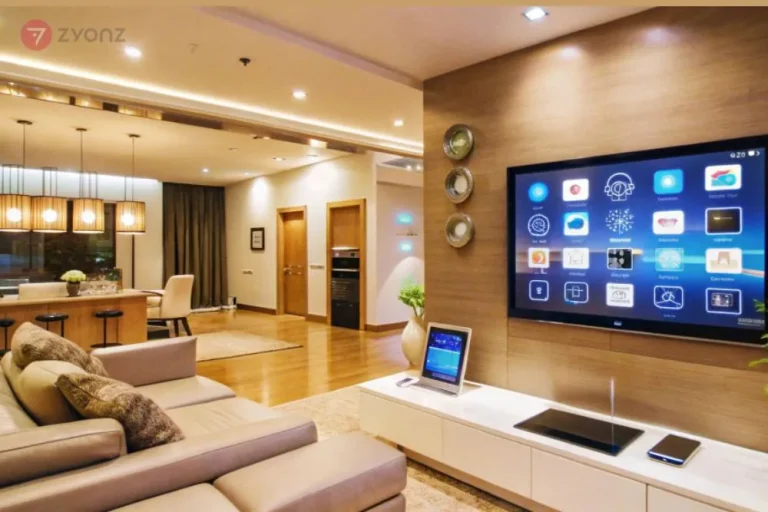Key Takeaways
- Smart home devices enhance convenience by automating daily tasks.
- They improve home security through advanced monitoring systems.
- Energy efficiency is boosted by smart appliances and systems.
- Health and wellness are supported through integrated technologies.
- Challenges include privacy concerns and device compatibility.
Smart home technology has rapidly evolved from a luxury to a mainstream necessity, providing homeowners with exceptional convenience and control over their living spaces. As devices become more intuitive and interconnected, they are not only making daily routines easier but also driving significant changes in the real estate market. For those considering a move or an upgrade to their living environment, connecting with Pleasanton CA real estate experts Armario Homes can offer additional insights into how modern smart technology can increase home appeal and value.
By incorporating smart thermostats, lighting, and security systems, households are experiencing enhanced safety, efficiency, and comfort. Real estate experts continue to note the growing importance of these features in buyer preferences, emphasizing the ongoing transformation in what people demand from their homes.
Enhancing Convenience Through Automation
Daily living has been dramatically simplified thanks to home automation. Voice assistants allow users to control lighting, adjust room temperature, switch appliances on or off, and even manage blinds with minimal effort. This level of automation brings ease to repetitive tasks and supports accessibility for individuals with mobility challenges. Smart thermostats, for example, not only keep homes comfortable but also learn the preferences and routines of residents to optimize energy use automatically. Similarly, smart lighting offers remote and scheduled operation, making saving energy and creating ambiance at home easier.
Boosting Home Security
Security remains a top priority for homeowners, and smart technology is at the forefront of these advancements. Modern smart security cameras come with features like night vision, high-definition video, and motion detection. Homeowners can check real-time feeds from anywhere in the world, giving them peace of mind on vacations or business trips. In addition, smart locks and alarm systems provide remote locking and unlocking capabilities, and users receive instant alerts if anything unusual happens at home. These systems are being credited with reducing crime rates in neighborhoods where smart devices are widely adopted.
Improving Energy Efficiency
Environmental sustainability is becoming increasingly important, and smart home devices play a significant role in this movement. Smart plugs, for instance, allow you to monitor and control the power usage of designated electronics, preventing unnecessary waste. Automated systems for heating, ventilation, and air conditioning (HVAC) adjust themselves according to weather and real-time occupancy readings, which helps families reduce their carbon footprint and save on monthly utility bills. Large-scale adoption of these tools supports a larger societal shift toward greener living, an aspect that many homebuyers seek.
Revolutionizing Home Entertainment
Home entertainment has seen a remarkable transformation, powered by smart devices. Smart TVs enable access to streaming platforms, internet browsing, and content recommendations based on user preferences. Integrated sound systems can sync music or audio throughout an entire home, enhancing the ambiance for entertaining guests or relaxing alone. These connected systems foster a seamless, immersive experience that can be easily managed by voice or remote apps.
Facilitating Healthier Lifestyles
The health and wellness sector also benefits from smart home technology. Devices like air quality monitors and air purifiers ensure healthier breathing environments, which is crucial for families with allergies or respiratory conditions. Smart fitness equipment, meanwhile, brings interactive workout experiences right into living rooms, complete with progress tracking and virtual coaching. Smart lighting can also regulate sleep cycles by mimicking natural sunrise and sunset patterns, supporting overall wellness.
Addressing Challenges: Privacy and Compatibility
Despite their many benefits, smart home devices are not without challenges. Privacy concerns are paramount, as interconnected devices can be susceptible to hacking and unauthorized data access. Homeowners should use robust passwords, enable encryption, and perform routine software updates to mitigate risks. Another challenge is compatibility—ensuring that devices from different brands work seamlessly together can require significant research and planning. Experts recommend choosing products that follow common industry protocols.
The Future of Smart Homes
The evolution of smart homes is far from over. Future developments such as the widespread adoption of 5G connectivity, sophisticated artificial intelligence, and advanced sensors will dramatically expand the capabilities and reliability of smart devices. Homes will become even more personalized, safe, and efficient. There is a growing emphasis on sustainability, with innovations focusing on renewable energy integration and environmentally friendly building materials, creating homes that are not only intelligent but also eco-conscious. The latest trends forecasted by Science News Today suggest that the smart home market will only continue to accelerate, ushering in a new era of interactive and sustainable living environments.
Smart home technology is delivering profound improvements in convenience, security, efficiency, and wellness. As innovation continues, embracing these technologies will increasingly shape the future of modern living, emphasizing not only intelligence and comfort but also sustainability and health.

